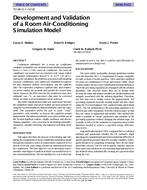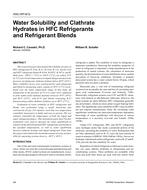The need for reducing carbon emissions from buildings has led to the adoption of absolute performance targets such as thermal energy demand intensity (TEDI) and energy use intensity (EUI) as part of building regulations and client design guidelines. This paper presents how, as airtightness and fabric efficiency in buildings increase, building process loads including ventilation and appliance selection become a determinant factor affecting TEDI.
The commonplace practice of using energy recovery in the ventilation equipment has left process ventilation from cooking and clothes drying as the remaining ventilation need requiring ducting to outside and with no heat recovery in place. Traditionally, equipment and appliances selected for kitchen extract and clothes drying are ducted to outside and, while this paradigm remains, ventilation heat losses and unnecessary façade penetrations complicate achieving TEDI targets. As electric or induction ranges replace natural gas cooking in residential and commercial settings due to decarbonization and indoor air pollution, kitchen hoods extracting to outside become redundant. The need for increased airtightness is likely to also make vented clothes dryers redundant due to potential depressurization, thermal bridge on the envelope, or wasted heat. Instead, it can be replaced with condensing clothes dryers, reducing the number of façade penetrations or the need for make-up air.
Product Details
- Published:
- 2022
- Number of Pages:
- 6
- Units of Measure:
- Dual
- File Size:
- 1 file , 2.1 MB
- Product Code(s):
- D-TO-22-C073
- Note:
- This product is unavailable in Russia, Belarus


